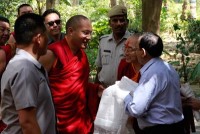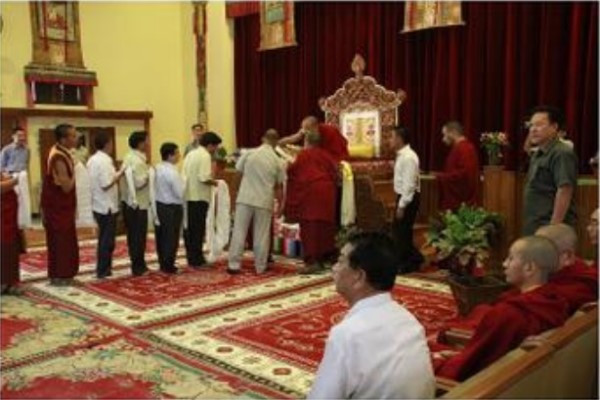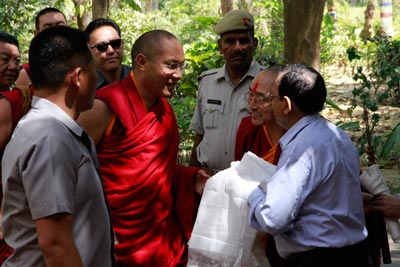法王新闻 | 2011年03月
『鹿野苑』對西藏研究中央大學師生發表演說
『Sarnath』Addresses Faculty and Students Of Central University for Tibetan Studies
ཝཱ་ཎ་དབུས་བོད་ཀྱི་ཆེས་མཐོའི་གཙུག་ལག་སློབ་གཉེར་ཁང་དུ་ཆིབས་བསྒྱུར།།

時間:2011年03月21日 21st March, 2011
地點:印度 鹿野苑 西藏研究中央大學 The Central University for Tibetan Studies, Sarnath, Varanasi, India
The Gyalwang Karmapa today visited the Central University for Tibetan Studies in Sarnath, and delivered an address to its students and faculty. During his annual stays in Sarnath, the Gyalwang Karmapa often lectures at the institute, which is the first accredited university in India to offer academic degrees in Tibetan studies.
法王今天蒞臨位於鹿野苑的西藏研究中央大學,對該校師生發表一場演說。每年法王於鹿野苑駐留期間,經常受邀至該校演講。西藏研究中央大學是在印度受到認可,並且能夠頒發西藏研究文憑的第一所大學。

Vice Chancellor Geshe Ngawang Samten gave a warm speech of welcome, praising the Gyalwang Karmapa for the acute sense of responsibility for preserving Tibetan cultures that he has displayed over the years.
西藏研究中央大學副校長嘎汪桑騰(Ngawang Samten)教授代表致熱烈的歡迎詞,讚揚法王在過去幾年來,對保存西藏文化所展現出的強烈使命感。
In his own address to the assembly, the Gyalwang Karmapa evoked the era when India was the far-away destination for Tibetan scholars and translators seeking Buddhist training and texts. His Holiness pointed out how many hardships these scholars of old had endured in order to have access to the same knowledge that students in India could now study so easily and comfortably at the institute. His Holiness commented that it would appear from our relatively good conditions would suggest that we have more merit nowadays than did the great Tibetan translators of the past. However, using the example of pretas, or hungry ghosts—who may be surrounded by food and drink yet remain unable to make use of them—the Gyalwang Karmapa encouraged his audience not to take the wonderful conditions for granted, but to recognize their great value and use them well. He further urged the students to take personal responsibility and direct their learning towards the aim of preserving Tibetan culture and religion.
法王在他的演說當中,首先喚醒大家記憶中古老的年代,那時印度曾經是尋求佛法的修持與典籍的西藏學者與譯師們遙遠的目的地。過去的這些學者們歷經千辛萬苦才能取得的知識,現在在印度的學生卻是舒服輕鬆地就能在這所大學裡研讀。法王評論道,從我們現在所具有的相對優越的條件來看,我們似乎比過去西藏那些偉大的譯師更有福報。但是,看看餓鬼道的眾生,即使是身邊充斥著山珍海味,他們卻絲毫無法受用,仍然是忍受著飢餓的痛苦。以這個例子,法王期勉著聽眾,不要將這些美好的條件視為是理所當然,而是要去認識到它們重要的價值,並且懂得善加利用。更進一步地,法王敦促該校的學生,應該以保存西藏的文化與宗教為己任,同時也以此為他們學習的目標與方向。
Continuing the theme he explored in his spring teachings, His Holiness noted that it ancient Asian cultures had incorporated a notion that education should first work to form good people, and only later, on that basis, focus on developing particular expertise or areas of knowledge. Using the example of scientists who use their knowledge to develop weapons, the Gyalwang Karmapa observed that knowledge when deployed by unscrupulous persons could be harmful. He therefore stressed that first one should lay the foundation of being a good, principled and happy person, and only then engage in serious study.
延續著法王在春季課程中所探討的主題,法王特別提出在亞洲傳統文化中所具有的一個觀念:教育首先要培養出的是一個好人,之後,在這個基礎上,再去發展出特殊的專長、或者是專業知識。就像是那些運用知識而發展出武器的科學家們一樣,法王觀察到:知識若為道德淪喪之徒所濫用,其結果可能是有害的。因此,法王強調,我們應當先打好基礎,成為一個善良、自律、而且快樂的人,唯有先立足在這樣的基礎之上,才再去談學問的鑽研。
His Holiness further encouraged the students to study not with the aim of just gaining knowledge for themselves, but rather with the aim of enriching themselves with knowledge to share with others. In this way, study could become a source of happiness, rather than merely a means of gaining fame or a high position in the world.
法王同時更鼓勵學生們,不只是為了獲取自己所要的知識而學習,而是為了與他人分享知識並且豐富自己而學習。如此一來,學習就能成為快樂的泉源,而不是只為能在世界上謀求名位的一種手段。
The morning’s program was concluded with a speech by the highly respected scholar Geshe Yeshe Thogden, who lauded the Gyalwang Karmapa’s message and urged the students to take his words to heart.
上午的活動,在備受尊崇的學者耶些竇登(Yeshe Thogden)教授的致詞後,圓滿結束。耶些竇登教授稱讚法王的演講內容,並且敦促學生們應將法王的話語謹記在心。
网页修改记录:2024年5月22日,新建网页。
